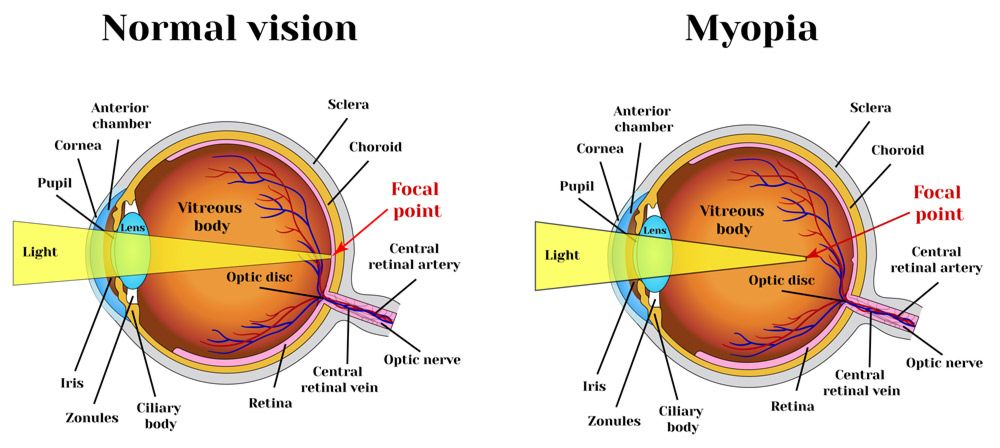Treating Nearsightedness with LASIK and Corrective Lenses
Myopia, or nearsightedness, is treated using a variety of surgical and non-surgical treatments, including custom contact lenses and LASIK. Our team of caring and friendly ophthalmic and optometric professionals in Dover, Newark, and Wilmington, DE, has been delivering comprehensive care using the latest techniques to our community for over 30 years. If you suffer with myopia, we can help you achieve improved distance vision.
What is Myopia?
Myopia is a common eye condition that causes distant objects to appear blurry and distorted. This condition is generally hereditary. Those with myopia have elongated eyes or steeply curved corneas, compromising the ability to properly focus incoming light onto the retina.
Myopia results from an inability to properly refract light entering the eye due to irregularities in the shape of the cornea or the entire eye.

Myopic patients can typically read with no issues, but will have difficulty seeing road signs and other distant images clearly. Patients with this disorder often squint to see the whiteboard in a classroom or conference room and end the day with fatigued eyes and a headache.
Myopia can be treated using variety of surgical and non-surgical treatments, including custom contact lenses and LASIK.
How is it Treated?
The type of treatment recommended will depend on the severity of the condition:
Non-Surgical Treatment
For patients with mild to moderate cases of myopia, we offer custom eyeglasses and contact lenses. This noninvasive treatment is also beneficial for young children and teens who are more likely to have changes in their vision as they grow. If myopia worsens, prescriptions can be easily updated as needed.
Surgical Treatment
If you are looking for a more permanent solution, we offer a number of surgical myopia treatments, including:
- LASIK: This popular refractive surgery uses laser technology to create a hinged flap in the cornea that grants access to the deeper tissue layers. This corneal tissue is reshaped to improve distance focus. LASIK has a success rate of more than 95 percent and involves a relatively short recovery.
- PRK: Photorefractive keratectomy (PRK) also uses laser technology to reshape the cornea. However, instead of creating a tissue flap, the entire outer layer of the cornea is removed. PRK has a longer recovery time than LASIK, but can provide virtually the same results. It is often recommended if a myopic patient has thin corneas.
- LASEK: This approach uses an alcohol solution to weaken the outer layer of the cornea, creating a hinged flap in order to access the underlying layers. As with PRK and LASIK, a laser is then used to reshape the cornea. Once completed, the flap is replaced, and a special lens is used to foster healing.
- Epi-LASIK: This approach is very similar to LASIK, but instead of using a laser to access the deeper layers of the cornea, a blade is used to create a thinner tissue flap.
Contact Our Office
If you are suffering with compromised distance vision, our practice offers effective solutions that can help you see your world in greater clarity. You can contact us online or give us a call at (302) 652-3353 to book a consultation.

